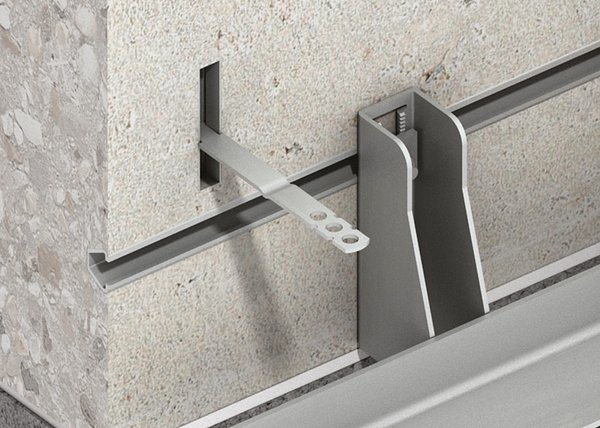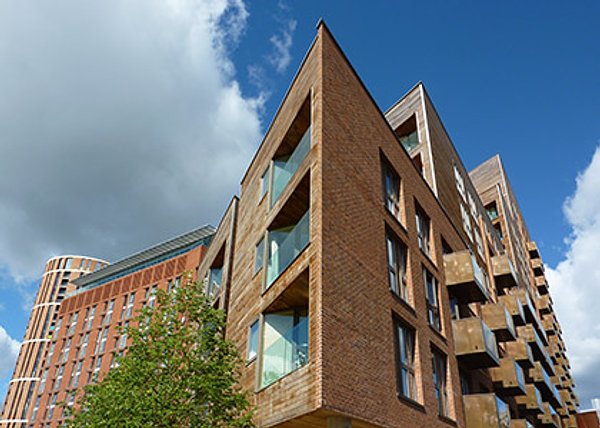Islington Wharf Phase 4, Manchester
The fourth and final phase of a major regeneration project in central Manchester’s Piccadilly Basin, Islington Wharf Phase 4 is an iconic residential development comprising two visually striking 11 and 16 storey buildings. Delivered by Waterside Places for developer, Latimer, they provide 106 contemporary one- and two-bedroom apartments, of which 54 are available on a shared ownership basis, providing much needed affordable homes in the heart of the city’s vibrant waterfront area.
Photo credit to Cara Group / 4Rotor Photography
In a prime position on the corner of Great Ancoats Street and Old Mill Street, the landmark buildings, by Main Contractor, Morgan Sindall Construction, also feature 3035 sq. ft of retail space alongside an attractive public area and parking for cars and cycles.
Designed by Ryder Architecture, the buildings are characterised by brick framed facades, punctuated by deep-set floor to ceiling windows that flood light into the modern high specification interiors, creating a Victorian warehouse aesthetic that pays homage to the rich industrial past of the historic canal-side site.
The challenge
To maximise ceiling heights, the buildings were constructed around a cast in-situ concrete frame, with floor slabs post-tensioned to optimise weight and slab thickness. With the façade brickwork supported from the slab edge at each level, the masonry support brackets were not only required to accommodate the PT pockets created for slab tensioning strands, which varied in position, but were subjected to significant additional loading due to the cantilever effect and deep brick returns. This was particularly pronounced in pier areas, where PT pockets meant masonry support could not be used and lower levels had to support double the brickwork load.
The large cantilever features at building corners posed additional challenges, meaning bracket supports had to be post-fixed, leading to potential clashes with rebar in the heavily reinforced slabs. This was further complicated by the absence of drawings to identify rebar positioning within the slabs, which also affected other items, including the locations of fixings for the mast climber restraining arms.
The solution
Leviat’s expertise in providing solutions for similar buildings in the past, coupled with their previous working relationships with the project engineers and architects, and with brickwork contractor Cara Brickwork, meant they were chosen by stockist, SIG, to provide a complete package of support solutions to meet the special requirements of the project.
To minimise on-site problems and delays, Leviat design specialists requested full on-site surveys to be carried out, including the drilling of pilot holes on site to clarify the exact position and embedment of the required fixings and locations of PT pockets, which varied considerably. Once approved by the project architects and engineers, individual loadings were calculated, and detailed specifications prepared using Tekla 3D modelling software.
Lengths of Leviat’s Ancon MDC masonry support system were then fabricated to suit the specific requirements, loadings and PT pocket implications of each individual location and supplied to SIG for just-in-time site delivery against the contractor’s predetermined build programme.
The design of the MDC units offered a 20mm fixing tolerance, enabling contractors on site to accommodate most of the variances in PT pocket locations and unexpected rebar density. Leviat’s technical and sales specialists provided support throughout the project, however, and where problems were encountered, were able to supply replacement MDC sections quickly, to enable the project to progress without delays.
Nick Mather, Contracts Manager for Cara Brickwork, was delighted with Leviat’s Ancon MDC solutions, and the support his bricklayers received throughout the complex project.“This was a relatively complex job, which involved laying around 160,000 bricks in total. Thanks to the versatility of the Ancon MDC support system and the back-up provided by the company’s technical team, we were able to meet all the high and variable loading demands and complete the job on time and within budget – achieving a flawless finish for the high-profile buildings” |
|---|
Find out more

Bespoke Bracket Angle Support
Ancon MDC Bracket Angle Support Systems can carry over 8 metres of brickwork and accommodate any width of cavity from 40mm in its standard form.

Masonry Support
Brick, block or stone cladding on steel or concrete framed structures is normally supported by stainless steel masonry support systems.

Residential
Innovative, reliable fixing and support systems bring visionary residential building designs to life








